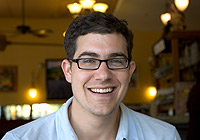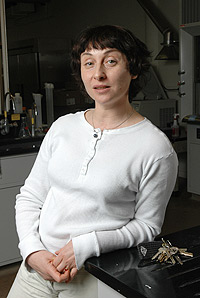Berkeleyan
Addressing questions of stem-cell ethics
Importance of multidisciplinary approach is emphasized at recent campus conclave
![]()
| 29 November 2006
Rarely has a medical revolution captured the hopes and horrors of so many as has stem-cell research. While many college campuses reflect this ethical divide, Berkeley's new Science, Technology, and Society Center (stsc.berkeley.edu) has brought scientists together with scholars in the humanities and social sciences in a unique effort to promote both innovation and values in biotechnology.
Key members of the multidisciplinary group gathered recently at the Women's Faculty Club to provide an update on their work.
"Innovation and ethics can and must coexist, and Berkeley can promote this," said STSC director Charis Thompson, an associate professor of rhetoric and of gender and women's studies.
Indeed, Thompson said, Berkeley is establishing itself as a frontrunner in this area. For example, Chancellor Robert Birgeneau allocated funds in early spring 2006 to kick-start the campus's stem-cell program, with a proportion of those funds going to research and training in the societal implications of stem-cell research.
Another example is provided by the Rothschild Foundation, which has funded stem-cell research at Harvard University. The foundation, which is particularly interested in the integration of ethics into university stem-cell programs, recently provided funding for the Berkeley program after learning about the multidisciplinary program here.
 Bioethicist David Winickoff calls the stem-cell issue an 'experiment in science and democracy.' (Bonnie Azab Powell photo) |
David Winickoff, STSC's associate director and an assistant professor of bioethics and society in the College of Natural Resources, said the stem-cell issue is "an experiment in science and democracy." (Winickoff expanded on this and other aspects of the stem-cell revolution in a NewsCenter feature two years ago, online at newscenter.berkeley.edu/goto/Winickoff.)
Other roundtable participants talked about how moral, legal, political, and religious forces shape the role of science in society, and suggested that the news media has an obligation to look beyond the hyperbole.
"Part of the public debate is that people are afraid of new things," said anthropology professor Paul Rabinow, co-author of A Machine to Make a Future: Biotech Chronicles. "Part of the function of media is to do a somewhat different job of presenting what's going on so that some of the fear-mongering and the hope-mongering, which go together, are somewhat downplayed."
Public fear and national-security concerns pose a formidable threat to scientific innovation, he said: "How do we defend free inquiry in all sectors of biosciences from being taken over by this or the next administration? How do we combat the anti-technical, anti-science feeling which is massive in the humanities and social sciences?"
And that is precisely what underscores the need for efforts such as the Science, Technology, and Society Center, said bioethicist Alta Charo, a visiting professor at the School of Law and a leading authority on stem-cell law. "The presence of multidisciplinary groups that are looking at the sciences is crucial because we've all seen science stopped dead in its tracks and defunded because of social reactions," Charo said.
 Irina Conboy notes the 'disconnect' on stem-cell issues between scientists and other academics.(Peg Skorpinski photo) |
Irina Conboy, an assistant professor of bioengineering who uses stem-cell science in an effort to combat degenerative diseases that come with aging, said the interchange is necessary because there is often a "disconnect" between academics and working scientists like herself.
"What we are trying to do is to create a dialogue," she said. Conboy, who plans to open her lab for public tours, pointed out that students also play a major role in the wide-ranging stem-cell-education effort on campus. For example, Conboy is sponsoring a student-taught DeCal class called "Stem Cells: Science and Society."
One former Berkeley student of stem cells and society is Josef Tayag, who after graduating earlier this year took his expertise to the Berkeley-based Greenlining Institute, which advocates for minority groups on a number of fronts.
Tayag has been focusing on how the benefits of California's Proposition 71, the $3 billion stem-cell initiative passed in 2004, will trickle down to the Greenlining Institute's constituents. In October the institute sponsored a stem-cell conference at Children's Hospital Oakland Research Institute called "Toward Fair Cures."
As a young Filipino immigrant in Southern California, Tayag said, he encountered many linguistic and economic barriers. When he got to Berkeley, he said, he hit his intellectual stride, particularly through his work at STSC.
"This is the kind of environment that Berkeley promotes," said Tayag. "It's amazing to see how low-income and minority students have so much to contribute if people just give them a shot. And Berkeley is one place that does give those students a shot."

